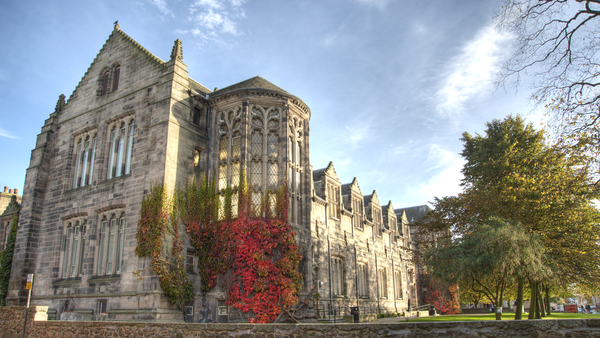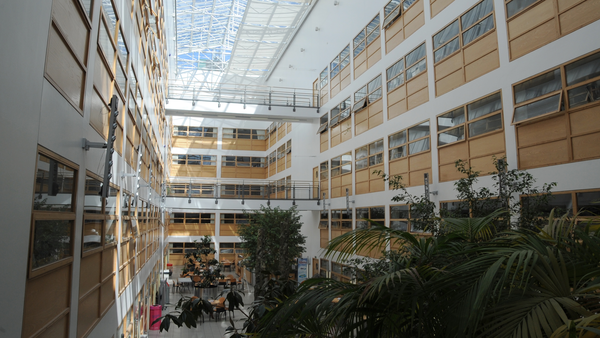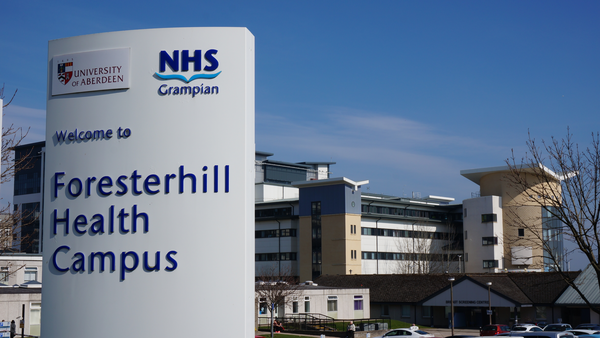
Introduction
The MSc in Biotechnology and Bioinformatics will provide students with in-depth training in key life sciences, including bioinformatics, that are central to modern biotechnology and the genomics revolution and will prepare graduates for employment in this growing sector.
Study Information
At a Glance
- Learning Mode
- On Campus Learning
- Degree Qualification
- MSc
- Duration
- 12 months or 24 months
- Study Mode
- Full Time or Part Time
- Start Month
- September
- Location of Study
- Aberdeen
The growth in the industrial biotechnology and biopharmaceutical sectors has led to exciting career opportunities for experienced graduates. Our MSc in Biotechnology and Bioinformatics is a unique opportunity to gain training in advanced biotechnology and bioinformatics. There is also an option to select training in bio-business and the commercialisation of scientific ideas.
The University of Aberdeen has an impressive reputation for producing successful spin-out companies in the broad area of biotechnology and pharmacology. This MSc has harnessed these skills to provide you with an understanding of the key scientific skills, including advanced biotechnology, centrally important for employment in this sector.
This MSc is ideal for graduates in life science, pharmacy and medical biosciences who want to improve their career prospects, widen their knowledge base linked to biotechnology and their own scientific interests, and are fascinated by the application of advanced bioinformatic techniques.
What You'll Study
The programme of taught courses will comprise lectures, tutorials, practical classes and small group demonstrations in laboratories.
Students have the option of taking a research project or a placement in the MSc programme.
The curriculum will be selected by the student in consultation with the programme co-ordinator with courses chosen from any of the current taught MSc courses offered by the School of Medicine, Medical Sciences and Nutrition.
- Stage 1
-
Compulsory Courses
- MT5010 Basic Skills Induction (0 credit points)
- Bioinformatics (MB5021)
-
15 Credit Points
A course containing a series of lectures describing 'latest-methods and discoveries' in areas of bioinformatics and functional genomics including transcriptomics, proteomics, and DNA sequence analysis.Contains a series of in-depth workshops that teach the principles and practice of next generation sequence analysis, transcriptomics, proteomics and sequence similarity analysis.
- Biotechnology (BT5014)
-
15 Credit Points
Modern biotechnology is absolutely dependent upon our increasingly sophisticated ability to use microbial and mammalian host cells as factories to produce high quantities of protein pharmaceuticals, e.g. insulin. Increasingly, cells engineered with multiple foreign genes are also being used to drive small molecule drug production. This course will explore how such heterologous protein expression processes can be engineered and optimised to drive efficient synthesis of the next generation medicines on which healthcare systems are increasingly depending.
- Getting Started at the University of Aberdeen (PD5006)
-
This course, which is prescribed for all taught postgraduate students, is studied entirely online, takes approximately 5-6 hours to complete and can be taken in one sitting, or spread across a number of weeks.
Topics include orientation overview, equality and diversity, health, safety and cyber security and how to make the most of your time at university in relation to careers and employability.
Successful completion of this course will be recorded on your Enhanced Transcript as ‘Achieved’.
Optional Courses
Students choose two electives from the following list:
- Small Molecule Drug Discovery (BT5013)
-
15 Credit Points
The course will focus on small molecule drug discovery. Receptor theory and cell communication and signalling will be revised to facilitate understanding of the remainder of the course. The basis of the drug discovery process will be described and the phases of drug development discussed. A range of targets for drug discovery will be identified and how small molecule drug affect these will be described. Issues around drug regulation will be raised.
- Molecular Genetics (MB5025)
-
15 Credit Points
The course provides a detailed exploration of the structure and function of genes at the molecular and biochemical level. It covers the analysis of genome activity from the 3D structure of chromosomes through to RNA and DNA-protein interactions. The course will provide you with a thorough understanding of the approaches and molecular biology techniques used in modern molecular genetics research and its applications in gene editing and gene therapies.
- Current Microbiology (MC5009)
-
15 Credit Points
This course will provide students with microbiology knowledge for further advanced studies and will provide training in microbiological laboratory techniques. At the end of this course students will have an understanding of microbes associated with health and disease (including bacteria, fungi and viruses), academic and practical understanding of laboratory techniques required for the culture, identification and characterisation of microbes, and increased confidence in reading and critiquing primary research literature.
Please note that some of the material on this course may describe animal research and/or may discuss disease outbreaks.
- Applied Statistics (PU5017)
-
15 Credit Points
This course in Applied Statistics focuses on the application of statistical techniques in postgraduate research for health professionals, with a particular emphasis on the correct interpretation of statistical analyses results. The course will NOT focus on the statistical theory underlying the subject. An important component of the course is the use of a statistical package (IBM SPSS), which can be used to implement all the methods taught on this course.
- Introduction to Commercialisation and Bio - Business (BT5016)
-
15 Credit Points
This course will describe the basic language of business and give examples of large versus small businesses in the bioscience area. Intellectual property rights will be explained as will how present your business and how to set up a small biotech company. A comparison will be made of the big Pharma business model and that of small biotech businesses.
- Stage 2
-
Compulsory Courses
- Advanced Bioinformatics and Genome Sequencing (MB5522)
-
15 Credit Points
An exciting course that brings a student right up to date with bioinformatics, genome assembly and annotation technology. You, the student, will analyse the genome of an unknown bacterium from the environment. The genome of this isolate has been extracted and whole genome sequenced. You will assemble your own bacterial genome and functionally annotate it, taught by expert bioinformaticians from our Centre for Genome-Enabled Biology and Medicine. Your analysis will enable you to identify the species you have isolated, produce a full inventory of genes and their presumptive functions, allowing an exploration of the antibiotic resistance potential of the bacteria. Overall, the course prepares a student for future employment in a biosciences' workplace, where genome sequencing, assembly and annotation is becoming an everyday tool of modern biotechnology.
- Advanced Biotechnology with Computation (BT5511)
-
15 Credit Points
This course will take the student through in-depth study of how synthetic biology, systems biology and computation are transforming the principles and practice of modern biotechnology. The course will teach modern methods of biotechnology including host cell design and optimisation using modern modelling techniques, leading to an understanding of how multiple genes under precise regulatory control can be introduced into a species to endow it with new biotechnologically valuable properties. The course will demonstrate the application of computer programming to bioinformatic analysis with direct relevance to modern biotechnology.
Through hands on study of synthetic biological processes in a series of workshops, students will learn how advanced genetic engineering of host expression systems can transform production of pharmaceuticals, chemical feedstocks and biofuels. Through workshop study of computer programming, students will gain hands-on knowledge of introductory programming skills relevant to genomic analysis and modern biotechnology. The course will equip students with a range of knowledge and skills directly relevant to modern biosciences, including the biotechnology industry.
Optional Courses
Students choose two electives from the following list:
- Biologic Drug Discovery (BT5509)
-
15 Credit Points
Biologic therapies represent one of the most important and novel areas of drug discovery in the 21st century. The aim of this course is to provide an insight into the success of protein, peptide or antibody based biologic therapies and to examine how this exciting new area will develop over the next decade.
- Advanced Bio - Business and the Commercialisation of Bioscience Research (BT5508)
-
15 Credit Points
This advanced course builds on the basics provided in Introduction to Bio-business and the Commercialisation of Bioscience Research (BT5012). It provides more detail on financing and setting up a Bio-business.
The course deals in depth with finance, corporate governance and business models. The major assessment involves the students working together in teams to set up a virtual bio-business and to pitch this business to a group of experts in the pharmaceutical and biotechnology sector. The team will adopt the roles of senior management team and present to the experts their part of the business.
- Advanced Genomic Tools in Biomedical Research (MB5528)
-
15 Credit Points
A course describing the wide range of ways in which genome sequencing has transformed biomedical research and our understanding of human disease.
Contains material detailing a range of examples of advanced genomic tools and technologies and their applications in biomedical science.
A course that makes wide use of the literature, allowing you to read about and understand the latest genomics-based methods.
A course placing a high value on its teaching and learning; lecture material supported by workshops – your chance to put knowledge into practice, ask questions and enjoy the science.
- Stage 3
-
Compulsory Courses
All students must take one of the following:
- Masters Research Project (Laboratory) (MB5904)
-
60 Credit Points
This course offers students the opportunity to complete a substantial piece of data-driven, empirical work within their field of study under the supervision of an experienced researcher.
Topics available will be varied but within the domain of their field of study. Alongside supervisors, students will identify a suitable topic area, describe an appropriate study design and implement an empirical study to be completed within a laboratory setting. Students will be involved alongside the supervisors in the process of defining the research question, and developing the research plan and, where appropriate, obtaining regulatory approvals. This course is for laboratory-based projects (if you are intending to undertake a project in non-laboratory setting you should register on PU5913)
- Masters Research Project (PU5922)
-
60 Credit Points
This course offers students the opportunity to complete a substantial piece of data-driven, empirical work within their field of study under the supervision of an experienced researcher.
Topics available will be varied but within the domain of their field of study. Alongside supervisors, students will identify a suitable topic area, describe an appropriate study design and implement an empirical study to be completed within a laboratory setting. Students will be involved alongside the supervisors in the process of defining the research question, and developing the research plan and, where appropriate, obtaining regulatory approvals. This course is for non-laboratory based projects (if you are intending to undertake a project in a scientific laboratory setting you should register on MB5913)
- Placement (BT5903)
-
60 Credit Points
The Placement course focus on the development of industry-relevant professional and technical skills and competencies. It is designed to meet the needs of the biopharma, bioscience and biotechnology industries, and those of contract research organisations, as the demand for highly skilled graduates in these sectors grows.
We will endeavour to make all course options available; however, these may be subject to timetabling and other constraints. Please see our InfoHub pages for further information.
Fee Information
| Fee category | Cost |
|---|---|
| EU / International students | £27,000 |
| Tuition Fees for 2024/25 Academic Year | |
| UK | £12,200 |
| Tuition Fees for 2024/25 Academic Year |
Additional Fee Information
- In exceptional circumstances there may be additional fees associated with specialist courses, for example field trips. Any additional fees for a course can be found in our Catalogue of Courses.
- For more information about tuition fees for this programme, including payment plans and our refund policy, please visit our InfoHub Tuition Fees page.
International Applicants
Further Information about tuition fees and the cost of living in Aberdeen
Funding Opportunities
The following options are available to support your studies.
- Alumni Discount Scheme - 20% discount for University of Aberdeen alumni
Scholarships
Self-funded international students enrolling on postgraduate taught (PGT) programmes will receive one of our Aberdeen Global Scholarships, ranging from £3000 to £8,500, depending on your domicile country. Learn more about the Aberdeen Global Scholarships here.
To see our full range of scholarships, visit our Funding Database.
How You'll Study
The teaching of our MSc Biotechnology and Bioinformatics programme is lecture based with self-directed learning, practical classes and tutorials to support the lecture material.
In the second semester students have a unique opportunity to individually assemble and analyse the entire genome of a microorganism isolated and characterised by students at the University of Aberdeen. External experts are also regularly invited to provide specialist expertise.
Many lectures are recorded and can be viewed again when required. The MSc makes the most of hands-on learning to enable repeated exposure to evidence-based practice using real life examples. Some of the teaching methods employed in the programme include:
- Inter-disciplinary and multi-disciplinary learning
- Exposure to leading academic and industry experts
- Research-led teaching taught by key opinion leaders
- Insight into real-life situations and examples
On-going support is provided by the University’s dedicated, interdisciplinary team of experienced researchers, who will be tutoring you. Peer support will develop throughout the course(s) as engagement with students from other countries and disciplines is actively encouraged.
Much of the teaching on this course is participatory and you are expected to consolidate all taught content by completing related tasks and activities and engaging in independent study in your own time.
Learning Methods
- Individual Projects
- Lab Work
- Lectures
- Peer Learning
- Professional Placements
- Research
- Tutorials
Assessment Methods
By practical work, by written essays and by oral presentations, or by a combination of these, as prescribed for each course.
The project or placement will be assessed on the basis of performance, written thesis or report, and oral presentation (project only) or reflective analysis (placement only).
Candidates must pass all courses at an appropriate standard for the award of the MSc degree.
Why Study Biotechnology and Bioinformatics ?
- You will be taught by world leading researchers in Biotechnology and Bioinformatics.
- You will have the option of undertaking a placement either within the University or with external organisations offering industry-focussed skills training, or carrying out a research-based project in the labs of the Institute of Medical Sciences on the Foresterhill Health Campus.
- Optional courses on Biobusiness can be taken as part of this Masters, helping you acquire your biotechnology business development skills.
- The programme helps meet the skills gap in this area which has been identified by the Scottish and UK governments.
- You will have access to business entrepreneurs and world-leading researchers on-site.
- You will have an opportunity to contribute to cutting edge research during your project.
- Courses in Biotechnology and Advanced Bioinformatics and Genome Sequencing give you the opportunity to carry out whole genome sequencing from a bacterial species you have isolated from the environment, and analyse that genome for novel properties.
- Advanced Biotechnology will give you an introduction to the latest biotechnology approaches to protein expression, including synthetic biology and modelling of biological systems.
- Aberdeen is recognised as Scotland’s commercial centre for drug discovery, with University of Aberdeen spin-outs in the vanguard of this; our courses in Bio-business give you direct access to this expertise via invited lecturers from the biotech spin-out community.
- Embedded within an active and dynamic research culture, you will have the opportunity to gain the knowledge and skills required to enhance your employability and further your career. There will also be opportunities to build a network of contacts within the biotechnology and pharmaceutical field.
- You will benefit from having access to teachers and researchers who are key opinion leaders in their field.
- We strongly believe in inter-disciplinary and multi-disciplinary learning, which is reflected in the collaborations we organise with other universities, research institutions and governments within the UK, Europe, America and more than 12 developing countries.
- We have a huge range of online learning materials so you can re-listen to lectures and access revision materials whenever you need to. We aim to make your learning as interactive as possible to improve your understanding of clinical scenarios and critical thinking.
Entry Requirements
Qualifications
The information below is provided as a guide only and does not guarantee entry to the University of Aberdeen.
Applicants will usually require a second-class Honours degree (2:2) or equivalent in a biological or biomedical science subject or a related degree.
Please check our International student pages for country-specific requirements.
Please enter your country to view country-specific entry requirements.
English Language Requirements
To study for a Postgraduate Taught degree at the University of Aberdeen it is essential that you can speak, understand, read, and write English fluently. The minimum requirements for this degree are as follows:
IELTS Academic:
OVERALL - 6.5 with: Listening - 5.5; Reading - 6.0; Speaking - 5.5; Writing - 6.0
TOEFL iBT:
OVERALL - 90 with: Listening - 17; Reading - 21; Speaking - 20; Writing - 21
PTE Academic:
OVERALL - 62 with: Listening - 59; Reading - 59; Speaking - 59; Writing - 59
Cambridge English B2 First, C1 Advanced or C2 Proficiency:
OVERALL - 176 with: Listening - 162; Reading - 169; Speaking - 162; Writing - 169
Read more about specific English Language requirements here.
Document Requirements
You will be required to supply the following documentation with your application as proof you meet the entry requirements of this degree programme. If you have not yet completed your current programme of study, then you can still apply and you can provide your Degree Certificate at a later date.
- CV
- an up-to-date CV/Resumé
- Degree Certificate
- a degree certificate showing your qualifications
- Degree Transcript
- a full transcript showing all the subjects you studied and the marks you have achieved in your degree(s) (original & official English translation)
- Personal Statement
- a detailed personal statement explaining your motivation for this particular programme
International Applicants
Aberdeen Global Scholarship
Eligible self-funded post graduate taught (PGT) students will receive the Aberdeen Global Scholarship. Explore our Global Scholarships, including eligibility details, on our dedicated page.
Aberdeen Global ScholarshipsCareers
There are many opportunities at the University of Aberdeen to develop your knowledge, gain experience and build a competitive set of skills to enhance your employability. This is essential for your future career success. The Careers and Employability Service can help you to plan your career and support your choices throughout your time with us, from first to final year – and beyond.
- More information on employability at the University of Aberdeen
- More information on the Careers and Employability Service
Our Experts
- Other Experts
- Professor Iain Gibson
- Dr Elaina Collie-Duguid
- Programme Coordinator
- Professor Ian Stansfield
Information About Staff Changes
You will be taught by a range of experts including professors, lecturers, teaching fellows and postgraduate tutors. Staff changes will occur from time to time; please see our InfoHub pages for further information.
Facilities

The Institute of Medical Sciences
Focused on developing future effective therapies, the Institute of Medical Sciences houses nearly 400 researchers and support staff working on cutting-edge biomedical subjects aimed at understanding the human body's response to infection and disease.

Foresterhill Health Campus
The Foresterhill Health Campus is one of the largest clinical complexes in Europe which includes the Medical School, large teaching hospital, the Institute of Medical Sciences and the Rowett Institute.

Science Teaching Hub
Our state-of-the-art Science Teaching Hub provides students with a digitally focussed environment including advanced analytical tools, research-grade equipment and flexible laboratory spaces.
Find out moreGet in Touch
Contact Details
- Address
-
Student Recruitment & Admissions
University of Aberdeen
University Office
Regent Walk
Aberdeen
AB24 3FX
